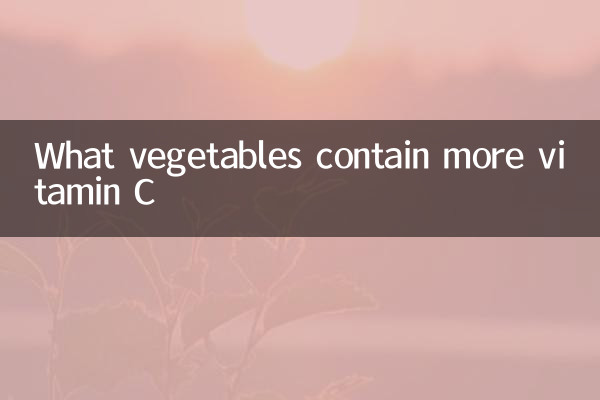What vegetables contain more vitamin C? Analysis of popular topics and scientific data across the entire network
Recently, healthy diet and nutritional supplements have become hot topics across the Internet, especially the intake of vitamin C has attracted much attention. With the changes in seasons and the increase in immunity demand, many netizens are searching for "what vegetables are rich in vitamin C". This article will combine popular discussions and scientific data over the past 10 days to analyze vegetables with high vitamin C content in detail and attach structured data comparisons.
1. Background of popular topics across the Internet

The number of discussions about "vitamin C" in social media and search engines has surged in the past 10 days, focusing mainly on the following directions:
1.Immunity enhancement: In the alternating seasons of autumn and winter, colds occur frequently, and vitamin C is frequently mentioned as an antioxidant and immune auxiliary ingredient.
2.Vegetables vs Fruits: Many people believe that fruits are the main source of vitamin C, but in fact, the vitamin C content of some vegetables is far greater than that of oranges, lemons and other fruits.
3.Impact of cooking methods: Heating will destroy vitamin C, so eating raw or fast stir-frying is more suitable for retaining nutrition.
2. Top 10 vegetables with high vitamin C content
According to the Chinese food ingredients list and international nutrition data, the following is the ranking of vegetables with the highest vitamin C content per 100 grams of edible part:
| Ranking | Vegetable name | Vitamin C content (mg) | Remark |
|---|---|---|---|
| 1 | Bell pepper (red) | 144 | About 3 times that of an orange |
| 2 | Kale | 120 | Common ingredients for salads |
| 3 | broccoli | 89 | It is recommended to steam and preserve nutrition |
| 4 | Momordica charantia | 84 | Good product for clearing heat in summer |
| 5 | brocoli | 61 | High content of white parts |
| 6 | spinach | 47 | Avoid long-term cooking |
| 7 | tomato | 34 | Eat raw better |
| 8 | Pea seedlings | 30 | Cold or hot pot |
| 9 | Sweet potato leaves | 28 | Emerging healthy vegetables |
| 10 | carrot | 16 | Need to be absorbed with oil |
3. How to efficiently intake vitamin C from vegetables?
1.Prefer fresh vegetables: Long-term storage will lead to loss of vitamin C and eat as soon as possible after purchase.
2.Reduce high temperature cooking: Quick fry or blanch (time is controlled within 1 minute) can retain more nutrients.
3.Paired with acidic ingredients: Such as lemon juice or vinegar, it can slow down vitamin C oxidation.
4.Avoid copper and iron utensils: This type of material will accelerate the decomposition of vitamin C.
4. Answers to hotly discussed questions from netizens
Q: Which is better, vitamin C tablets or vegetables?
A: Vitamin C in natural vegetables is more easily absorbed and contains other synergistic nutrients (such as flavonoids), but supplements can easily meet daily needs.
Q: Do frozen vegetables affect the vitamin C content?
A: Quick freezing technology can retain most of the nutrients, but repeated thawing will significantly reduce the content.
Summarize: Vegetables such as red bell peppers, kale are the "invisible champions" of vitamin C. Reasonable selection and cooking can maximize nutritional intake. A healthy diet does not have to rely on expensive fruits, and ordinary vegetables can also become a high-quality source of vitamin C!

check the details

check the details